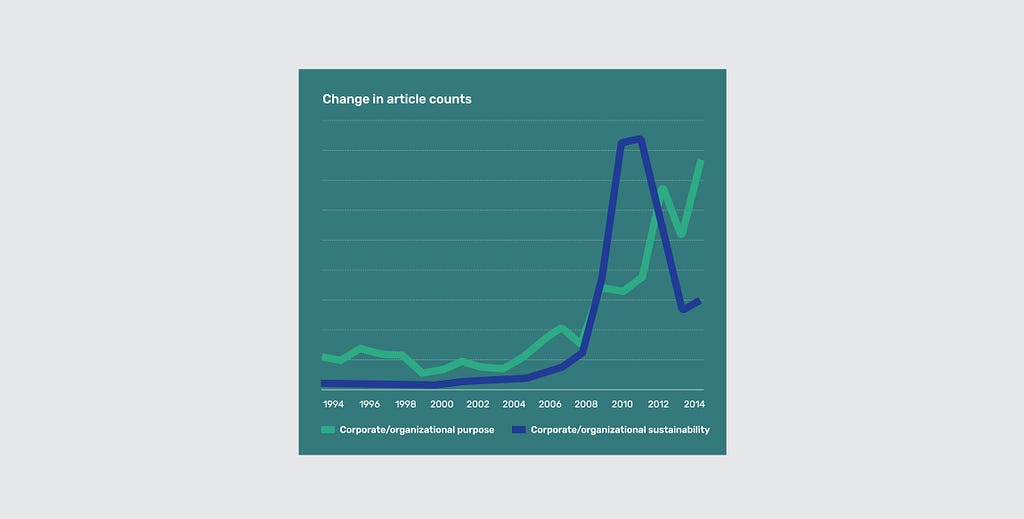
This Time of Crisis Could Speed the Transformation of Capitalism. But Will We Seize the Opportunity?
By Tom Moore
Over the last few weeks, we have witnessed the unfolding of a human tragedy on a global scale. First and foremost a health challenge, COVID-19’s wider impact extends across society. It has impacted our lives irrevocably.
It has forced us to reflect on how we live, who we have become, and where we are headed in the future. The implications of the crisis will continue to reverberate, onwards and outwards, shaping this decade and beyond.
As the initial shock of the crisis starts to subside, it is natural to look forward. As individuals and organisations, we are beginning to consider the details of our post-pandemic reality.
It is suggested that many aspects of our lives will be separated into BC (before coronavirus) and AC (after coronavirus). The way we travel, the way we consume, the way we relate—so many components of our existence are undergoing radical change.

Whilst there’s no going back to the BC versions of ourselves, the AC terrain will combine the new with the familiar. Like the “Zone” in Tarkovsky’s classic film Stalker, elements of our post-COVID-19 world will be immediately recognisable and yet also reconfigured, interacting with us in new ways.
Some of the older ideas and narratives will be gone. Others that were with us in our BC lives will remain, but their importance and impact will have increased exponentially.
Birth of Purpose
The contemporary concept of purpose — a higher goal beyond profit, driving an organisation’s activities — has become increasingly recognised over the last decade. Although we have seen a major growth over the last five years, the initial spike of interest in purpose was in 2008. It came as a direct response to the recession, when many organisations were forced to reject legacy business thinking and adopt new models.

Purpose grew out of a post-2008 belief that business needs to redefine its role and relationship with society, and that companies can be a force for good. They can move away from being predatory and focused on short-term profits. Instead of limiting their focus on generating value for shareholders, businesses can adopt the idea of creating shared value for all.
This growth of purpose-driven businesses has become directly linked to a new understanding of the economy and increased questioning of economic models based on continued growth.
In recent years, the signals have been getting louder:
- An explosion of empirical research on why purpose-driven companies perform better than their non-purpose counterparts.
- The growth of the Certified B Corporation movement and Conscious Capitalism; Business Roundtable’s shift away from shareholder primacy.
- The Davos Manifesto for better capitalism.
- The Edelman Trust Barometer showing 75% of people believe that business can be a force for good in society as well as profitable.

A Moment of Truth
From our vantage point in early 2020, we see that this is the first global crisis since purpose entered the business mainstream.
This is new territory for purpose—a critical point on its journey from the fringes into the core of business discourse.
Purpose has arrived at its own moment of truth. We might see it reinforce itself as a central pillar within the business mainstream. Or we might see a radical disruption and an end to its recent story of progress.
As with any moment of truth, this could go one of two ways.

Crisis Capitalism
In a more pessimistic scenario, the COVID-19 crisis and its fallout will stimulate a reactionary shift back to more predatory forms of capitalism. Here, short-termism and quick profits win out. This will decrease the rate of purpose adoption or — worse still — bring a wholesale rejection of the ideas and values held within it.
This scenario is real.
In her book The Shock Doctrine, Naomi Klein describes the economic model of constant growth as a “crisis-creation machine.” In moments of extreme difficulty, people are at their weakest and most vulnerable. They are less likely to resist the imposition of new realities.
History gives us a clear view of the dangers involved when a system is under severe strain. Klein shows how moments of crisis have been used regularly to impose neo-liberal, free market economic models. Power grabs and economic impositions, unthinkable in calmer circumstances, become standard fare.
We have been warned.

An Alternate View
As Yuval Noah Harari has outlined, a crisis serves to speed historical processes. If we allow ourselves to embrace a more optimistic perspective, the impact of coronavirus could accelerate the adoption of purpose.
In this scenario, just as the financial crash of 2008 helped to introduce the concept of purpose, the COVID-19 crisis accelerates the next phase of business transformation and the arrival of a more socially centered form of capitalism.
More companies begin to see their interdependent relationship with society and the planet. More people in business recognise that economic models of continual growth do not take into account the world’s limited resources.
In this scenario, purpose takes a bold next step, not only consolidating its position in the business mainstream but establishing its influence even further, allowing purpose-driven activity to become the dominant business paradigm.
Multiple factors will influence how this situation plays out. But we can highlight two related questions that will play a key role in steering us closer to the more positive scenario.
Performance of Purpose-Driven Companies
Inevitably, all eyes are on companies already working with purpose.
Numerous studies show how, in general, purpose-driven companies outperform other businesses. The performance of these companies will be closely analysed during and post-crisis to see their results in times of extreme difficulty.
No company is crisis-proof.
Having a purpose does not provide an organisation with immunity to defend itself against the shocks of its macro environment. Many great socially driven ideas and innovations won’t arrive in the market. Many excellent companies working to generate value in the right way will close their doors.
However, a large amount of evidence suggests that purpose-driven companies are well equipped not only to survive but to thrive in a challenging context.
Purpose improves agility, as the guidance of a clear “north star” helps leaders to make quicker, better decisions. On the customer side, these companies experience higher levels of loyalty. And internally, the engaged, motivated workers in these organisations are better able to manage moments of transition through improved collaboration and resilience.
In this moment of truth, a strong performance from purpose-driven organisations will reinforce the message that they are better equipped to cope with the volatility and complexity of the modern business environment. Even allowing for variations across industries and geographies, today there is a critical mass of purpose-driven companies that enable us to assess the benefits of a more conscious approach at scale during a crisis, in a way that we have never seen before.
Purpose Activism
The second factor involves speaking up and taking action.
In these paradoxical times — of physical isolation and digital presence, of everything in paralysis yet simultaneously in flux — it can be difficult to keep a focus on the details. Our environment around us is changing at high speed. We are trying to relearn our role within it, and how to interact with it.
At this moment, there might be a temptation to observe the situation first before taking action.
But the danger of a “wait-and-see” approach is self-evident.
As shown above, moments of crisis are always moments of opportunity. There are always winners and losers at these times. If people involved in purpose-driven businesses don’t impose themselves to defend and further what they believe in, someone else will.
Therefore, there is a need for everyone engaged in conscious and socially driven business to be vocal and active at this time.

There is a need to demonstrate how many of these ideas and approaches that already exist are ready-made to support the construction of a post-COVID-19 world.
This involves dialogue and communicating effectively through private and organisational channels. Shining a light on the things that really matter.
It also means adopting the right approaches. We need to be prioritising future-focused, transformative tools that support the participatory construction of our future. To this end, Adam Kahane’s Transformative Scenario Planning, Michael Schrage’s Who Do You Want Your Customers To Become and John Elkington’s new book Green Swans are all relevant and instructive at this time.
Leaning into the Unknown
Arundhati Roy describes the pandemic as a portal: “a gateway between one world and the next.” She explains that we have a choice: We can either walk through it filled with all our old prejudices and dead ideas, or we can walk through it “lightly … ready to imagine another world.”
And, crucially, “ready to fight for it.”
We need to adopt this idea and apply it in our organisations.
This is not a time for falling back on what we already know. It’s a time for leaning forward into the unknown, no matter how uncomfortable it might be.
We know there’s no going back. But we don’t yet know the new world that we are stepping into.
We need to imagine it, invent it, fight for it.
Tom Moore is a partner at Mandalah São Paulo, a Certified B Corporation. B the Change gathers and shares the voices from within the movement of people using business as a force for good and the community of Certified B Corporations. The opinions expressed do not necessarily reflect those of the nonprofit B Lab.

A Moment of Truth for Purpose-Driven Businesses was originally published in B The Change on Medium, where people are continuing the conversation by highlighting and responding to this story.